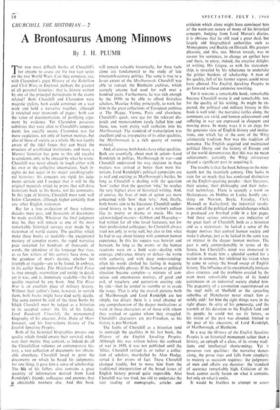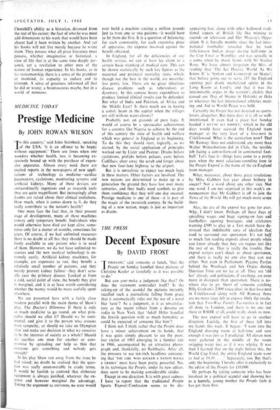A Brontosaurus Among Minnows
CHURCHILL THE HISTORIAN-2
By J. H. PLUMB
THE two most difficult books of Churchill's I for anyone to assess are the two vast series on the two World Wars. Can they compare, say, with Clarendon's great History of the Rebellion and Civil Wars in England, perhaps the greatest of all personal histories : that is. history written by one of the principal participants in the events related? Both Churchill and Clarendon were majestic stylists, both could construct on a vast scale and hold a narrative together, although it stretched over thousands of pages: both saw the value of documentation, of justifying argu- ment by evidence. Yet Clarendon possesses subtleties that were alien to Churchill's tempera- ment; less socially secure, Clarendon was far more suspicious, not only of human motives, but also of those of society as a whole. He was keenly aware of the tidal forces that can break the structure of established institutions, and many a Marxist historian has gone to this old royalist to condemn, only to be amazed by what he wrote. Churchill was never closely in touch either with his own or the collective unconscious. Such in- sights do not occur in his major autobiographi- cal histories: his concepts are rigid, his judg- ments certain and I suspect that it will be the original materials which he prints that will drive historians back to his books, not his comments. In this type of history, Churchill must rank well below Clarendon, although higher certainly than any other English statesman.
But for a true evaluation of these volumes decades must pass, and thousands of documents be made available. Whatever the final judgment may be, they will remain as one of the most remarkable historical surveys ever made by a statesman of world stature. The qualities which make these books so readable—the exceptional mastery of complex events, the rapid narrative pace sustained for hundreds of thousands of words, the splendour of the language that rises, as so few writers of this century have done, to the grandeur of man's destiny, whether for triumph or tragedy—are to be found, in embryo, in his earlier books. The Malakand Field Force is, true enough. overwritten and untidy in detail, yet it was, and is. immensely readable—the first quality required by any book. And The River War is an excellent piece of military history. Without their author's fame, however, to sustain them, both books might have died early deaths. The same cannot be said of the three books by ivhich Churchill must be judged as a historian in its accepted sense: the life of his father, Lord Randolph Churchill, the monumental biography of his ancestor, John, Duke of Marl- borough, and his four-volume history of The English Speaking Peoples.
Both of his historical biographies possess one quality which should ensure their survival, what- ever their merits; they contain, as indeed do all the Churchillian volumes on contemporary his- tory, a vast collection of documents not obtain- able elsewhere. Churchill loved to print the documents on which he based his judgments; for one thing, it gave him a sense of scholarship. The life of his father, also, contains a great quantity of information derived from Lord Randolph's friends, colleagues and enemies that is obtainable nowhere else. And this book
will remain valuable historically, for these facts alone are fundamental to the study of late nineteenth-century politics. The same is true to a lesser extent of the Marlborough. Churchill was able to ransack the Blenheim archives, which scarcely anyone had used for well over a hundred years. Furthermore, he was rich enough by the 1930s to be able to afford first-class scholars, Maurice Ashley principally, to work for him in the great collections of European archives at The Hague, Vienna, Paris and elsewhere. Churchill's quick, sure eye for the relevant dis- patch and memorandum rarely failed him and these, too, went pretty well verbatim into his Marlborough. The standard of transcription was excellent and so, irrespective of its other qualities, the Marlborough is a rich quarry of source material.
And, of course, both books have other qualities. Both are essentially about men in action—Lord Randolph in politics, Marlborough in war—and Churchill understood the way decision in these matters was arrived at better than most his- torians. Lord Randolph's political campaigns are as real and exciting as Marlborough's battles. So long as Churchill is dealing with the question 'how' rather than the question 'why,' he reaches the very highest class of historical writing. And, of course, the lives of men of action are more concerned with 'how' than 'wty.' And, finally, both books aim to be literature. Churchill under- stood history to be a part of a nation's culture like its poetry or drama or music. His two acknowledged masters—Gibbon and Macaulay— had written for all who loved literature, not for their professional colleagues. So Churchill always tried not only to write well, but also to link what he had to say about history with common human experience. In this his success was betwixt and between. So long as the events or the human reactions were on a bold scale—dealing with courage, endurance, misery or defeat—he wrote with authority and with deep understanding: often his words clothed his feeling in majestic and memorable phrases. If the human or political situation became complex--a mixture of con- scious and unconscious motives, of good and evil, of treachery and patriotism existing side by side—then he tended to stumble or to evade the issues. That is why the overall pictures both of Marlborough and Lord Randolph are too simple, too direct; there is a total absence of any comprehension of the deeper motivations at work in these characters or of those with whom they worked or against whom they struggled. Churchill's characters are pre-Freudian, as his history is pre-Marxian.
The faults of Churchill as a historian tend to outweigh the qualities in his last book, the History of the English Speaking Peoples. Although this was written before the outbreak of war in 1939, it was not published until the 'fifties. Churchill revised it, or rather a collec- tion of scholars, marshalled by Alan Hodge, vetted it for errors of fact. These Churchill changed readily, but to move him from the traditional interpretation of the broad issues of English history proved quite impossible. Also Churchill was too tired, too old to undertake the vast reading of monographs, articles and
criticism which alone might have convinced him of the worn-out nature of many of his historical concepts. Judging from Lord Moran's diaries, it is obvious that he still read a great deal, but largely old biographical authorities such as Moneypenny and Buckle on Disraeli. His greatest pleasure, and this, too, Moran reveals, was to savour his sentences, to change an epithet here and there, to enjoy, indeed, the creative delights of writing. His fatigue, as with his statesman- ship, is revealed by his reluctance to undertake the grittier burdens of scholarship. A man of his quality, full of his former vigour, could never have allowed The English Speaking Peoples to go forward without extensive rewriting.
Yet it remains a remarkable book, remarkable because Churchill wrote it and remarkable, too; for the quality of his writing. As might be ex- pected, the political and military history in this book is well told: the narrative rattles along, the comments are vivid, and human achievement and suffering in war are expressed in eloquent and moving prose. In many ways it is an elegy fot the generous view of English history and institu- tions, one which lay at the. core of the Whig aristocratic tradition. Nor was this tradition all nonsense. The English acquired and maintained political liberty and the history of Europe and of the world demonstrates that this was no mean achievement; certainly the Whig aristocracy played a significant part in acquiring it.
The trouble is that the book belongs to the nine- teenth not the twentieth century. One looks in vain for so much that has conferred distinction on the English-speaking peoples—their literature. their science, their philosophy and their indus- trial technology. There is scarcely a word on Shakespeare, on Hobbes or Locke, hardly any- thing on Newton, Boyle, Faraday, Clerk Maxwell or Rutherford; the industrial revolu- tions and all the political and social changes which it produced are brushed aside in a few pages. And these serious omissions are indicative of the great fault of Churchill, both as a historian and as a statesman : he lacked a sense of the deeper motives that control human society and make it change, just as he lacked in the same way an interest in the deeper human motives. The past is only comprehensible in terms of the future, but Churchill's mind was immersed in tradition. It made him a splendid symbol for a nation in torment, but inhibited his vision when he came to survey the broad sweep of English history. The influence of its exceptionally intricate class structure and the problems created by the even more remarkable tenacity of its feudal continuum in an industrial society eluded him. The pageantry of a coronation superimposed on the steel mills of Sheffield or the sprawling suburbia of Manchester never struck him as mildly odd: for him the right things were in the right places. In spite of his generosity, and the warmth of his devotion to the English land and its people, he could not see its future, so his vision of the past was clouded, limited to the past of his ancestors, of Lord Randolph, of Marlborough, of Blenheim.
In a way the History of the Englksh Speaking Peoples is an historical monument rather than a history, an epitaph of a class, of its strong tradi- tions and intellectual shortcomings. Yet it possesses rare qualities: the narrative dances along, the prose rises and falls from simplicity to majesty as occasion requires: the judgments of men and affairs are decisive: the standard of accuracy remarkably high. Criticism of the book cannot easily fasten on what it contains, but only on what it omits.
It would be fruitless to attempt to assess
Churchill's ability as a historian, divorced from the rest of his career; the fact of who he was must add dimensions to his work that would have been absent had it been written by another. And yet his books will not live merely because he wrote them. They possess what all great literature must possess, whether imaginative or historical, a view of life that is at the same time deeply per- sonal, yet a revelation to other men of the nature of human experience. In his books, as in his statesmanship, there is a sense of the grandeur of mankind, its capacity to endure and to triumph. A sense of greatness informed all that he did or wrote; a brontosaurus maybe, but in a world of minnows.































 Previous page
Previous page